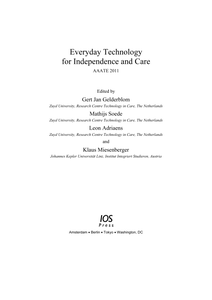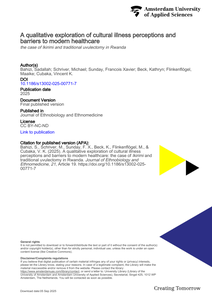BACKGROUND: Multimorbidity, the co-occurrence of two or more chronic medical conditions within a single individual, is increasingly becoming part of daily care of general medical practice. Literature-based discovery may help to investigate the patterns of multimorbidity and to integrate medical knowledge for improving healthcare delivery for individuals with co-occurring chronic conditions. OBJECTIVE: To explore the usefulness of literature-based discovery in primary care research through the key-case of finding associations between psychiatric and somatic diseases relevant to general practice in a large biomedical literature database (Medline). METHODS: By using literature based discovery for matching disease profiles as vectors in a high-dimensional associative concept space, co-occurrences of a broad spectrum of chronic medical conditions were matched for their potential in biomedicine. An experimental setting was chosen in parallel with expert evaluations and expert meetings to assess performance and to generate targets for integrating literature-based discovery in multidisciplinary medical research of psychiatric and somatic disease associations. RESULTS: Through stepwise reductions a reference set of 21,945 disease combinations was generated, from which a set of 166 combinations between psychiatric and somatic diseases was selected and assessed by text mining and expert evaluation. CONCLUSIONS: Literature-based discovery tools generate specific patterns of associations between psychiatric and somatic diseases: one subset was appraised as promising for further research; the other subset surprised the experts, leading to intricate discussions and further eliciting of frameworks of biomedical knowledge. These frameworks enable us to specify targets for further developing and integrating literature-based discovery in multidisciplinary research of general practice, psychology and psychiatry, and epidemiology.
DOCUMENT
Background: In general people after stroke do not meet the recommendations for physical activity to conduct a healthy lifestyle. Programs to stimulate walking activity to increase physical activity are based on the available insights into barriers and facilitators to physical activity after stroke. However, these programs are not entirely successful. The purpose of this study was to comprehensively explore perceived barriers and facilitators to outdoor walking using a model of integrated biomedical and behavioral theory, the Physical Activity for people with a Disability model (PAD). Methods: Included were community dwelling respondents after stroke, classified ≥ 3 at the Functional Ambulation Categories (FAC), purposively sampled regarding the use of healthcare. The data was collected triangulating in a multi-methods approach, i.e. semi-structured, structured and focus-group interviews. A primarily deductive thematic content analysis using the PAD-model in a framework-analysis’ approach was conducted after verbatim transcription. Results: 36 respondents (FAC 3–5) participated in 16 semi-structured interviews, eight structured interviews and two focus-group interviews. The data from the interviews covered all domains of the PAD model. Intention, ability and opportunity determined outdoor walking activity. Personal factors determined the intention to walk outdoors, e.g. negative social influence, resulting from restrictive caregivers in the social environment, low self-efficacy influenced by physical environment, and also negative attitude towards physical activity. Walking ability was influenced by loss of balance and reduced walking distance and by impairments of motor control, cognition and aerobic capacity as well as fatigue. Opportunities arising from household responsibilities and lively social constructs facilitated outdoor walking. Conclusion: To stimulate outdoor walking activity, it seems important to influence the intention by addressing social influence, self-efficacy and attitude towards physical activity in the development of efficient interventions. At the same time, improvement of walking ability and creation of opportunity should be considered
DOCUMENT

This article explores the decision-making processes in the ongoing development of an AI-supported youth mental health app. Document analysis reveals decisions taken during the grant proposal and funding phase and reflects upon reasons why AI is incorporated in innovative youth mental health care. An innovative multilogue among the transdisciplinary team of researchers, covering AI-experts, biomedical engineers, ethicists, social scientists, psychiatrists and young experts by experience points out which decisions are taken how. This covers i) the role of a biomedical and exposomic understanding of psychiatry as compared to a phenomenological and experiential perspective, ii) the impact and limits of AI-co-creation by young experts by experience and mental health experts, and iii) the different perspectives regarding the impact of AI on autonomy, empowerment and human relationships. The multilogue does not merely highlight different steps taken during human decision-making in AI-development, it also raises awareness about the many complexities, and sometimes contradictions, when engaging in transdisciplinary work, and it points towards ethical challenges of digitalized youth mental health care.
LINK
Evidence-based research (EBR) is the systematic and transparent use of prior research to inform a new study so that it answers questions that matter in a valid, efficient, and accessible manner. This study surveyed experts about existing (e.g., citation analysis) and new methods for monitoring EBR and collected ideas about implementing these methods. We conducted a cross-sectional study via an online survey between November 2022 and March 2023. Participants were experts from the fields of evidence synthesis and research methodology in health research. Open-ended questions were coded by recurring themes; descriptive statistics were used for quantitative questions. Ideas proposed in this study for monitoring the implementation of EBR can be used to refine methods and define responsibility but should be further explored in terms of feasibility and acceptability. Different methods may be needed to determine if the use of EBR is improving over time.
MULTIFILE

Technological literacy (TL) is a central theme in healthcare and laboratory professional education. The rapid speed of technological development in the healthcare sector, clinical and laboratory practice calls for new knowledge, skills and attitudes in future professionals and therefore for new approaches in teaching. Here we describe a teaching approach based on computational thinking (CT) and aimed at increasing the TL of biomedical laboratory science (BLS) students. We discuss the background for why we use CT as framework, the intended learning outcomes and how these link to the needs in the students’ future practice. Furthermore, in an international network of teachers and researchers in the BLS, Chemical and Biotechnical Science and radiography education programs, we carried out a systematic observation study of parts of the teaching and use the reflection notes from the observer group to discuss how the intended TL competencies play out in the teaching sessions and the students´ activities in these. We discuss how the teaching approaches support, or not, the development of the students´ TL. This study is part of an Erasmus+ network aimed at developing novel teaching approaches to support students´ technological literacy.
DOCUMENT
Objectives This exploratory study was conducted to find out how well the concept of evidence-based research (EBR) is known among European health researchers with substantial clinical research experience, and which barriers affect the use of an EBR approach. The concept of EBR implies that researchers use evidence synthesis to justify new studies and to inform their design. Design A cross-sectional exploratory survey study. Setting and participants The survey was conducted among European health researchers. Respondents included 205 health researchers (physicians, nurses, dentists, allied health researchers and members of other professions involved in health research) with a doctoral degree or at least 5 years of research experience. Primary and secondary outcome measures The primary outcome measures were the level of awareness of the concept of EBR and the presence of barriers affecting the use of an EBR approach. Secondary outcome measures include correlations between sociodemographic characteristics (eg, profession) and awareness of EBR. Results We discovered that 84.4% of the respondents initially indicated their awareness of the concept of EBR. Nevertheless, 22.5% of them concluded that, on reading the definition, they either do not know or do not fully comprehend the concept of EBR. The main barriers affecting the use of an EBR approach were related to organisational issues, such as not being attributed resources (30.5% of the respondents), time (24.8%) or access to implement it (14.9%). Conclusions Despite the limitations, this study clearly shows that ongoing initiatives are necessary to raise awareness about the importance of implementing the EBR approach in health research. This paper contributes to a discussion of the issues that obstruct the implementation of the EBR approach and potential solutions to overcome these issues, such as improving the knowledge and skills necessary to practice the EBR approach.
MULTIFILE

Transitions in health care and the increasing pace at which technological innovations emerge, have led to new professional approach at the crossroads of health care and technology. In order to adequately deal with these transition processes and challenges before future professionals access the labour market, Fontys University of Applied Sciences is in a transition to combining education with interdisciplinary practice-based research. Fontys UAS is launching a new centre of expertise in Health Care and Technology, which is a new approach compared to existing educational structures. The new centre is presented as an example of how new initiatives in the field of education and research at the intersection of care and technology can be shaped.
DOCUMENT

BackgroundUnderstanding cultural perceptions of illness is crucial for effective healthcare delivery. This study examines the ethnomedical concept of ikirimi, a culturally recognized illness in Rwanda characterized by perceived uvula abnormalities, and its traditional management through uvulectomy. This study explores the cultural understanding of ikirimi, its perceived causes, symptoms, and treatments, as well as barriers to integrating modern healthcare.MethodsAn exploratory qualitative approach was employed, involving in-depth semi-structured interviews with eight participants: traditional healers, individuals who underwent traditional uvulectomy, and healthcare providers. A grounded theory approach which analyzes data in systematic manner to generate new theories was applied, with coding conducted in English after initial transcription and analysis in Ikinyarwanda to preserve Indigenous concepts.ResultsParticipants described ikirimi as an illness affecting the uvula (named as akamironko or akamirabugari or agashondabugari in Ikinyarwanda), characterized by swelling, elongation, and pus-like discoloration. Reported symptoms included fever, difficulty swallowing, coughing, and weakness, with children identified as the most affected group. Traditional healers diagnosed ikirimi through visual inspection of uvular morphology and movement and treated it by cutting the affected part of uvula and is known as guca Ikirimi ‘traditional uvulectomy’. Barriers to integrating modern healthcare included skepticism about biomedical care, judgmental attitudes from providers, and communication gaps. Despite the prevalence of ikirimi, its biomedical correlates remain unclear, though participants associated it with severe throat illnesses such as tonsillopharyngitis.ConclusionThe findings highlight ikirimi as a socially constructed illness with deep cultural roots, significant health implications, and persistent barriers to modern healthcare. Addressing these barriers requires culturally sensitive approaches that integrate Indigenous knowledge with biomedical practices. Future research should explore the biomedical correlates of ikirimi and foster collaboration between traditional and modern healthcare systems to improve patient outcomes.
DOCUMENT

Through a qualitative examination, the moral evaluations of Dutch care professionals regarding healthcare robots for eldercare in terms of biomedical ethical principles and non-utility are researched. Results showed that care professionals primarily focused on maleficence (potential harm done by the robot), deriving from diminishing human contact. Worries about potential maleficence were more pronounced from intermediate compared to higher educated professionals. However, both groups deemed companion robots more beneficiary than devices that monitor and assist, which were deemed potentially harmful physically and psychologically. The perceived utility was not related to the professionals' moral stances, countering prevailing views. Increasing patient's autonomy by applying robot care was not part of the discussion and justice as a moral evaluation was rarely mentioned. Awareness of the care professionals' point of view is important for policymakers, educational institutes, and for developers of healthcare robots to tailor designs to the wants of older adults along with the needs of the much-undervalued eldercare professionals.
DOCUMENT
